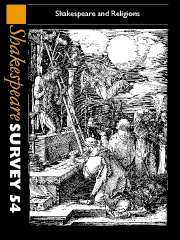Book contents
- Frontmatter
- Shakespeare and the Protestant Mind
- Divine [ ]sences
- ‘An alien people clutching their Gods’?: Shakespeare’s Ancient Religions
- ‘He drew the Liturgy, and framed the rites’: The Changing Role of Religious Disposition in Shakespeare's Reception
- Jonson, Shakespeare, and the Religion of Players
- The Bard and Ireland: Shakespeare’s Protestantism as Politics in Disguise
- ‘Every Good Gift From Above’ Archbishop Trench’s Tercentenary Sermon
- Anthony Munday and The Merchant of Venice
- Perfect Answers: Religious Inquisition, Falstaffian Wit
- When Suicide Becomes an Act of Honour: Julius Caesar and Hamlet in Late Nineteenth-Century Japan
- Religion in Arden
- A Wedding and Four Funerals: Conjunction and Commemoration in Hamlet
- Between Religion and Ideology: Some Russian Hamlets of the Twentieth Century
- Of Shadows and Stones: Revering and Translating ‘the Word’ Shakespeare in Mexico
- Ministers, Magistrates and the Production of ‘Order’ in Measure for Measure
- The Hebrew Who Turned Christian: The First Translator of Shakespeare into the Holy Tongue
- Shakespeare and English Performance Style: The European Context
- All At Sea: Water, Syntax, and Character Dissolution in Shakespeare
- King John, König Johann: War and Peace
- The Tempest’s Forgotten Exile
- The Old Lady, or All is Not True
- Shakespeare Performances in England, 2000
- Professional Shakespeare Productions in the British Isles January-December 1999
- The Year's Contributions to Shakespearian Study 1 Critical Studies
- 2 Shakespeare’s Life, Times, and Stage
- 3 Editions and Textual Studies
- Books Received
- Index
King John, König Johann: War and Peace
Published online by Cambridge University Press: 28 March 2007
- Frontmatter
- Shakespeare and the Protestant Mind
- Divine [ ]sences
- ‘An alien people clutching their Gods’?: Shakespeare’s Ancient Religions
- ‘He drew the Liturgy, and framed the rites’: The Changing Role of Religious Disposition in Shakespeare's Reception
- Jonson, Shakespeare, and the Religion of Players
- The Bard and Ireland: Shakespeare’s Protestantism as Politics in Disguise
- ‘Every Good Gift From Above’ Archbishop Trench’s Tercentenary Sermon
- Anthony Munday and The Merchant of Venice
- Perfect Answers: Religious Inquisition, Falstaffian Wit
- When Suicide Becomes an Act of Honour: Julius Caesar and Hamlet in Late Nineteenth-Century Japan
- Religion in Arden
- A Wedding and Four Funerals: Conjunction and Commemoration in Hamlet
- Between Religion and Ideology: Some Russian Hamlets of the Twentieth Century
- Of Shadows and Stones: Revering and Translating ‘the Word’ Shakespeare in Mexico
- Ministers, Magistrates and the Production of ‘Order’ in Measure for Measure
- The Hebrew Who Turned Christian: The First Translator of Shakespeare into the Holy Tongue
- Shakespeare and English Performance Style: The European Context
- All At Sea: Water, Syntax, and Character Dissolution in Shakespeare
- King John, König Johann: War and Peace
- The Tempest’s Forgotten Exile
- The Old Lady, or All is Not True
- Shakespeare Performances in England, 2000
- Professional Shakespeare Productions in the British Isles January-December 1999
- The Year's Contributions to Shakespearian Study 1 Critical Studies
- 2 Shakespeare’s Life, Times, and Stage
- 3 Editions and Textual Studies
- Books Received
- Index
Summary
Friedrich Dürrenmatt's König Johann, published in 1968, is described as a Bearbeitung (reworking or adaptation): it departs considerably from Shakespeare's original, inventing and modernizing freely, and sometimes inserting material from The Troublesome Reign of John, King of England.
Dürrenmatt's version is certainly more cynical (or at least more openly cynical) than Shakespeare's. There is, for instance, the arrival of the Archduke of Austria as ally to the French at the beginning of Act 2. Since he was responsible for the death of Richard Coeur de Lion, he might not seem an appropriate person to help restore the English crown to Richard's nephew Arthur: in Shakespeare we are told, by the French king, that he is doing this to make amends (no doubt this is the official version); in Dürrenmatt the French king remarks:
Österreichs Zug / Hierher ist nur ein Vorwand, unser Land Zu plündern.
(Austria's campaign is just a pretext to plunder our country.)A more complex example is the bargain that ends the battle, by which France abandons Arthur's claim to the English throne in return for receiving the English possessions in France. In Shakespeare, the governor of Angiers proposes that further fighting be avoided by means of a match between Blanche of Spain, John's niece, and the Dauphin, which is accepted once John has offered 'Anjou and fair Touraine, Maine, Poitiers, / And all that we upon this side the sea . . . / Find liable to our crown and dignity.' (2.1.488-91)
- Type
- Chapter
- Information
- Shakespeare Survey , pp. 213 - 222Publisher: Cambridge University PressPrint publication year: 2001



